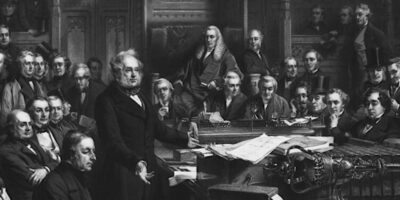The Economics of Autarky
The idea of autarky is that economic production should be restricted to the geography of the nation-state insofar as it is possible. It’s an idea that has deeply influenced the current president of the United States, as he has made clear since at least the beginning of the presidential campaign in 2015. People were mostly in denial, ignoring his many statements to this effect, but daily tweets (for example, demanding that Apple bring all production home, and celebrating tariffs as wonderful for a nation) plus bad-faith negotiations with trading partners are causing the reality finally to set in.
It’s time we understand what this notion of autarky is all about, simply because it seems to be making a big comeback in today’s world, as surprising as that sounds in a time when global supply chains are more interwoven than ever. It’s a lesson that no idea, no matter how often it has been refuted in theory and practice, is so fully beaten down that it cannot come back from the dead under the right conditions.
It Begins With List
The idea of national autarky in its modern form traces to the German economist Friedrich List and his 1841 book The National System of Political Economy. List came to the idea under the influence of Friedrich Wilhelm Joseph Schelling, who was Georg Friedrich Hegel’s roommate in college. List moved to Pennsylvania in 1825 and worked as a journalist with a great deal of influence, pushing what he regarded as an update of the economic views of Alexander Hamilton.
The root here is Hegelian philosophy and its longing for a strong state to swamp individual decision-making. It is not so much economic as political and philosophical: history must drive toward centralized power under great men and their intellectual advisors. Economic forces must be restricted to the bounds of the nation-state, because those bounds are the limits of the jurisdiction of the powers that be. Trade outside the borders, in this case, represents a kind of treason against state power.
List articulated a core principle that “the interest of individuals” must be “subordinated to those of the nation,” and that must be expressed most clearly in its policy toward trade. His crucial point was the rejection of the very idea of freedom that had given birth to the modern world and its replacement by a new idea of national management of economic life, requiring, in the first instance, a policy of autarky.
The idea of autarky stands in complete opposition to the theory of free trade. In Adam Smith’s rendering, the fundamental basis of wealth creation is the expansion of the division of labor. The broader this expansion — whether outside a family, outside city walls, or beyond a nation’s borders — the greater opportunity exists to build a prosperous society. This is the view that came to dominate in the 19th century, despite the push by autarkists. They didn’t win the debate. By the late 19th century, economic nationalism was widely seen as a reactionary and defunct doctrine, so much so that even small tariffs were repealed and states found other ways to raise money for themselves.
The Great Depression
The problem for free traders is that no matter how many times they win the day, the idea of autarky is always lurking out there. It usually begins in the simple desire of domestic producers to be protected from cheaper foreign products. Then it mutates gradually based on simple economic errors. In what sense is it ever a benefit to a nation for any producer to make things abroad and bring them in? Doesn’t that cost jobs? Doesn’t that just drain the national wealth?
So in 1930, following the great stock market crash of 1929, Congress massively raised tariffs in the mistaken notion that this would help the economy recover. The Smoot-Hawley Tariff Act drove the economy into a deeper pit. As always, this action plus the deepening economic crisis bolstered anti-liberal opinion all over the world.
In 1933, none other than John Maynard Keynes reversed his lifelong warmth toward the free trade idea and made a case for autarky as a model. As usual, his rhetoric was evocative:
I sympathise, therefore, with those who would minimise, rather than with those who would maximise, economic entanglement between nations. Ideas, knowledge, art, hospitality, travel — these are the things which should of their nature be international. But let goods be homespun whenever it is reasonably and conveniently possible; and, above all, let finance be primarily national. Yet, at the same time, those who seek to disembarrass a country of its entanglements should be very slow and wary. It should not be a matter of tearing up roots but of slowly training a plant to grow in a different direction.
Can you imagine what a gigantic transformation of the old trading relationships this would be? It doesn’t matter if it would take place slowly, as he recommends, or quickly. The results would be the same: to shrink rather than expand the division of labor, and hence prosperity along with it.
Why would Keynes go this direction? Because he had come to believe in a new form of macroeconomic planning that would supplant the old, laissez-faire model. If government and its intellectual leaders are going to be dedicated to economic planning, they have to control the resources. The extent of control is limited by the range of the jurisdiction. It then becomes crucial that both commerce and finance live only within the bounds of the nation-state. That is to say, autarky serves the purposes of economic planning.
This is why, for example, the same essay is effusive with praise of any nation that has left the old model of the free market:
But today one country after another abandons these presumptions. Russia is still alone in her particular experiment, but no longer alone in her abandonment of the old presumptions. Italy, Ireland, Germany have cast their eyes, or are casting them, towards new modes of political economy. Many more countries after them will soon be seeking, one by one, after new economic gods. Even countries such as Great Britain and the United States, though conforming in the main to the old model, are striving, under the surface, after a new economic plan. We do not know what will be the outcome. We are — all of us, I expect — about to make many mistakes. No one can tell which of the new systems will prove itself best.
Now, the case of Russia is egregious. Stalin had gained full control by 1929. By the time Keynes published his essay, the Ukrainian famine was full on. By a year later, 6 to 7 million people had died of starvation or intentional killing. Some “experiment.” Mussolini was the dictator of Italy. As for Germany, in 1933, the Nazi party was mostly in control of the country. It was pushing its own policy of national autarky called Lebensraum. Two years later, Triumph of the Will appeared in cinemas as the Nuremberg Laws went into full effect.
Mises Weighs In
What role did autarky play in this? It was a primary economic goal of the National Socialists. Mises later wrote in his 1944 book Omnipotent Government as follows:
The international division of labor is a more efficient system of production than is the economic autarky of every nation. The same amount of labor and of material factors of production yields a higher output. This surplus production benefits everyone concerned. Protectionism and autarky always result in shifting production from the centers where conditions are more favorable — i.e., from where the output for the same amount of physical input is higher — to centers where they are less favorable. The more productive resources remain unused while the less productive are utilized. The effect is a general drop in the productivity of human effort, and thereby a lowering of the standard of living all over the world.
The economic consequences of protectionist policies and of the trend toward autarky are the same for all countries…. Germany does not aim at autarky because it is eager to wage war. It aims at war because it wants autarky — because it wants to live in economic self-sufficiency.
Mises could not have been clearer and more resounding in his conclusion:
Our civilization is based on the international division of labor. It cannot survive under autarky. The United States and Canada would suffer less than other countries but even with them economic insulation would result in a tremendous drop in prosperity. Europe, whether itself united or divided, would be doomed in a world where each country was economically self-sufficient.
And following the Second World War, Mises’s view prevailed. The drive toward free trade became a consensus for most of the world. The views of the Right Hegelians, List, Keynes, and the others were swept aside with the General Agreement on Tariffs and Trade and a trend extending over many decades toward ever freer trade. It was never perfect, and it all required too much state management and too many treaties, but it was happening. It was largely unquestioned, and the world grew incredibly prosperous as a result.
But we live in times when the notion of autarky as a productive force for a nation has made a wicked comeback, for the same reason it has always ascended. It is not about economic flourishing. It is about political control by the centralized nation-state, the well-being of the citizen be damned. Every tariff (a tax against the citizens), every non-tariff barrier (rising prices paid by citizens), exchange control, and regulatory demand for at-home production means a reduction in wealth and opportunity for everyone. Contrary to claims, autarky (for a nation, city, family, or individual) is not a plan for prosperity but for impoverishment.












